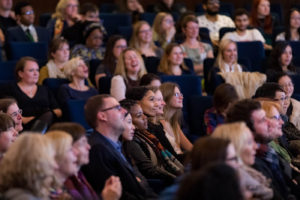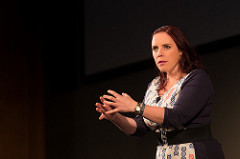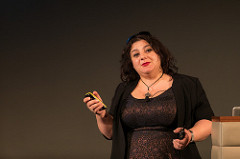Guest post by Aphra Bennett (aged 16)
In October, I had the privilege of attending Ada Lovelace Day and I was not disappointed.
This was the third year I have attended Ada Lovelace Day and I have watched it blossom every year, with more speakers, more people and bigger venues. That night, I was unsure what to expect because it seemed like in one year Ada Lovelace Day had blown up out of nowhere. I don’t know whether it was because it was at The IET’s Savoy Place, and I felt quite tiny surrounded by other extremely professional looking adults, or if was the fact that I felt like a mother with a child who finally realises her child has evolved into an adult. Don’t get me wrong – this is exactly what made me happy, the fact that Ada Lovelace Day was finally getting the recognition it rightfully deserved.
The first time I attended Ada Lovelace Day, I was convinced that I had to do some sort of job in STEM. I greatly admired all these women, with all these cool jobs. To some girls my age, a job in STEM is something we keep hearing about, but never actually consider because we just think ‘it’s just not for me’. Of course, when asked why ‘it’s not for you’, we don’t really have a clear definite answer, just ‘Oh, I’m not that good at maths’ or something along those lines that we have unfortunately all heard. Those statements are usually followed by an uncomfortable laughter or silence because deep down we all know that’s not a good enough reason.
However this isn’t our fault. It’s extremely easy to convince yourself that you are bad at any STEM subjects, because they are presented as these unattainable professions that only few with the correct IQ and brain capacity can participate in, and most of time usually with a male face attached. Of course, we all know that’s complete rubbish, but that’s just not how it’s presented to us. We think just because we weren’t able to come up with E=mc2 in our sleep, ‘it’s just not for me’. Imagine where we’d be if all scientists with scientific breakthroughs had thought this! Where would we even be? Well, thankfully due to events like the wonderful Ada Lovelace Day, all these silly preconceived notions seem to disappear, and hope is found. Suddenly, you feel like you could be a scientist, an engineer, a technologist, a mathematician. It feels closer to home. And I cannot express how important it is that for just those couple of hours, sitting there listening to and admiring these awe-inspiring women talk about their work fields is enough for girls like me to believe that one day we could be the ones talking on that stage.
What that stood out for me was Dr Kat Arney’s talk about genes and the unlikeliness of them. It made you realise how much a single human being contains inside them.We walk around so oblivious to the fact that we are so intricate on the inside and there are so many things occurring just to make us who we are. This talk for me stood out because it made science more human that it already is. I don’t know about you, but when I was in biology classes, when discussing the human body, I made no connections to actual humans in the sense that I did not think once to myself ‘Oh wow all the people sitting in my class right now are alive and breathing because of what I’m learning today’. We treat the biology of our body like some separate entity from our actual selves. But this talk seemed to connect the biological human body to, I guess, the emotional part of the human body. Another particularly interesting talk was from Dr Bissan Al-Lazikani, about the advancement in cancer research. It felt like a cure for cancer was a close and attainable goal, that could happen in my lifetime, and that in itself was inspiring and uplifting.
Overall, I can honestly say that I never leave Ada Lovelace Day uninspired. I cannot express how happy I am that this event exists and how much it will increase the chances of women and girls of going into STEM. Because that’s the goal isn’t it? Why would we go further in human history whilst leaving behind half its population? Scratch that – how could we go further in history whilst leaving behind half its population? It sounds stupid if you ask me. We need women and girls in STEM because they are the future. Ada Lovelace imagined a future way beyond her years; now let’s imagine our own, where women and girls are at the forefront. Ada planted the seed, the founder of Ada Lovelace Day watered it, now it’s our turn to make it blossom.


